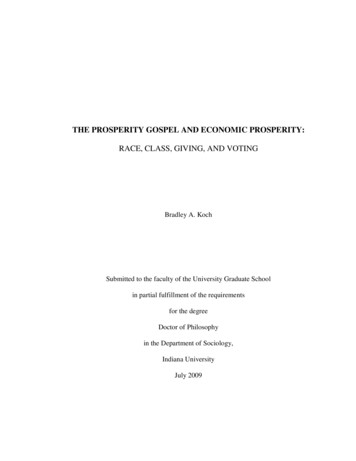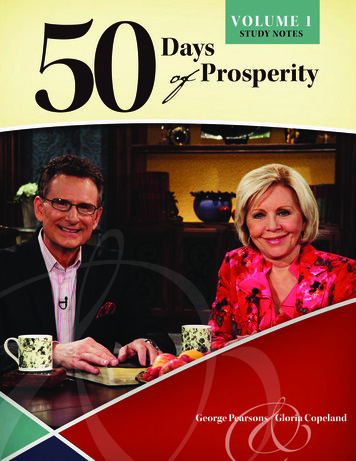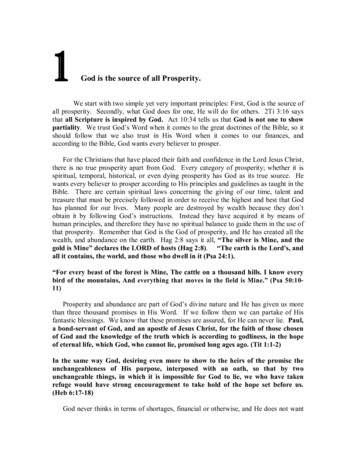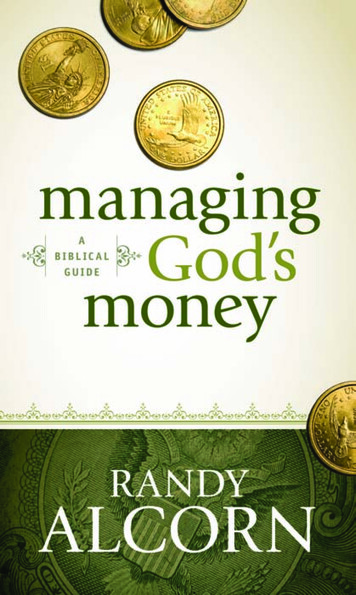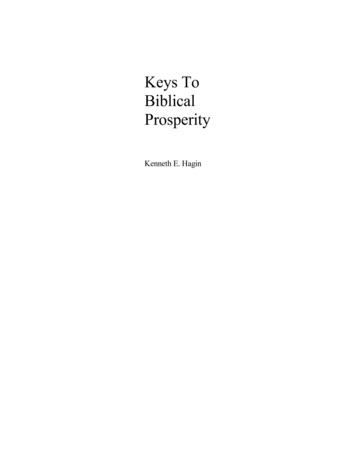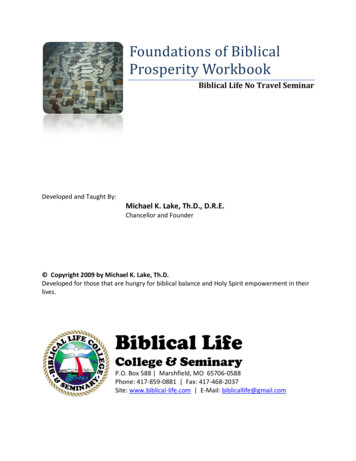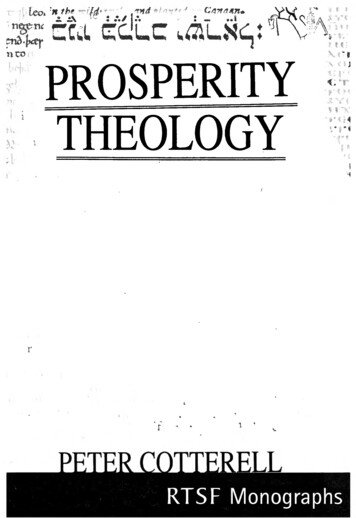
Transcription
l'"&'" . /\ {; ·. . ,.Y.rn;."-t:eUJ .7(-t:) AY(f:)(! 1l· E::\'t· .,, .) I.)Yrim. )\ n.:1t.1
PROSPERITY THEOLOGYByPETER COTTERELL PETER COTTERELLISBN 1 870137 213Published by:Religious and Theological Studies Fellowship38 De Montfort StreetLEICESTERLE1 7GPFirst Published MARCH 1993RTSF publishes a series of booklets on a wide range oftheological and religious studies topics. For a free catalogueand order form write to the above address.
PROSPERITY THEOLOGYIntroductionSection 1 : What is Prosperity Theology?The origins of prosperity theologyThe theology of prosperity definedSection 2: Prosperity Theology: Some Biblical TextsSection 3: Prosperity Theology: A CritiqueThe absence of a biblical world viewA defective hermenuticAn ambivalent attitude towards knowledgeAn unbiblical dualismSection 4 : A Biblical Understanding of Rich and PoorThe canonical teaching of Scripture on prosperityThe canonical teaching of Scripture on healingConclusionFootnotesSelect Bibliography1
INTRODUCTIONI am not an academic theologian. My theology is shaped by nineteen yearsas a missionary in Ethiopia. From my understanding of the Bible andfrom my experience through the years I believe in otherwise inexplicable,miraculous, healing. But, unlike the prosperity theologians I do notbelieve that our prosperity, whether in respect of health or wealth, relatesin any law-related manner to our faithfulness to God.And I am appalled by the cynical manipulation of myriads of Christiansby those who promise prosperity in return for faith, and in return, also,for some more-or-less precisely spelled out financial contributionthrough the post or in the bag.We who are in the forefront of the search for prosperity already havefar more of the world's wealth than is good for us. What I would wantto see would be a replacement of this appetite for more by the optionfor the poor, the determination to share with the peoples of Ethiopiaand the Sudan and Bangladesh, with the peoples of the townships likeSoweto, the squatter camps like South Africa's Crossroads, with the poorof New York and Liverpool and Bombay.2
SECTION 1WHAT IS PROSPERITY THEOLOGY?The Origins of Prosperity TheologyIt is important to recognise that prosperity theology is only part of amulti-faceted and aberrant form of Christianity which validates itselfthrough a shrill insistence on its being 'biblical' but which in fact owesmore to the kind of thinking associated, for example, with the New AgeMovement than to Scripture. It is theosophical; it is dualistic; it is mystical;it is gnostic; it claims an esoteric wisdom not found in other strands ofChristianity. And some elements of the charismatic movement along withother parts of the evangelical church, through its disdain of scholarship,have become permeated with it.Dan McConnell has demonstrated with irresistible scholarship that theroots of prosperity theology in all its manifestations are to be found inKenneth Hagin, of the Rhema Bible Institute in Tulsa, Oklahoma.McConnell argues that Kenneth Hagin took most of his ideas from EW Kenyon. And it is clear that Hagin did not merely adopt Kenyon'stheology, but also was guilty of wholesale plagiarism from Kenyon'swritings.'The significance of this identification of the source of prosperity teachinglies in the character of Kenyan's theology. McConnell quotes Kenyan'svision of the future to be brought about by his new teaching:When these truths really gain the ascendancy in us, they will makeus spiritual supermen, masters of demons and disease. It will bethe end of weakness and failure. 2This is remarkably similar to New Age theology, a theology in whichthought overpowers everything negative:'New Age' thinking is a concept designed to unlock this potential.The key to its success lies in the exhortation: 'That which you canconceive and believe in, you can achieve'. 33
And there is a further possible dimension to this emphasis on the positive:personal responsibility for sin is eliminated. Norman Vincent Peale'sPositive Thinking seeks to convert traditional terms of Christian theology,such as sin, repentance, guilt into their positive counterparts, holiness,forgiveness, frcedom 4 without passing through repentance, without asense of guilt. Everything becomes instantaneous light, total freedom,perfect power.What I am saying here is that prosperity theology is only one of a bundleof unbiblical theologies which lie seductively and confusingly acrossmodern evangelical theology. Freudian psychology with its views of thehuman subconscious 'like a dark cauldron of powerful forces largelybeyond our conscious control'5 lies behind much of contemporarycounselling practice, and yoga techniques of relaxation and emptying themind (a notion which is alien to biblical Christianity Phil 4.8) haveinfiltrated even into evangelical conferences. And its seductive power isrooted in the contemptuous dismissal of orthodox theology and even ofcommon logic. The fact that any thinking person knows that not allChristians prosper in business, however faithful they may be, affects theirthinking not one whit. As we shall see below facts are dismissed asirrelevant and misleading elements in a material world into whichprosperity and New Age thinking imports a spirituality which utterlytranscends it.The Theology of Prosperity DefinedThere is no one authoritative theology of prosperity. Like liberationtheology, it is a bundle of theologies which share a common philosophicalcore.The logic lying behind prosperity theologies is uncomplicated and to thatextent persuasive. Simply expressed the logic passes through fivepropositions.14God is omnipotent.
2He is a Father to his redeemed people.3Like all fathers he wants his children to enjoy life, or, expressingthe same thought negatively, he does not wish his children to sufferin any way.4However, his care for his children is limited by their obedience tohis will. A rebellious child cannot at the same rime be a child whois enjoying life. Or, again expressed negatively, a rebellious child isnot blessed by his father; the blessing is withheld, in order to returnthe child to the condition of blessing.5There is, in fact, a direct relationship between our obedience toGod and our prosperity. The matter of obedience to Scripture (orfaithfulness to covenant) as the pre-requisite for prosperity isagreed by all schools of prosperity.The term prosperity is understood in various ways: as financial andmaterial, as concerning physical health, as concerning spiritual well-beingand effectiveness, and as various combinations of these.It is the extent to which the law clement in the fifth proposition isformalised, and in the various understandings of the key term prosperitythat the theologies may be distinguished from one another.The logic of the theology may also be expressed by a simple appeal tocommon sense. God is our Heavenly Father, but he loves us far morethan any ordinary father could: it is a perfect love. Unlike ordinary parentsGod is not at the mercy of circumstances, but above them, over them.No ordinary father would wish his children to be poor, or sick, ormentally backward. Ordinary parents cannot always do what they wouldlike to do for their children. God can, and he does.The presumed 'laws' of prosperity arc variously framed, and are more orless comprehensive depending on the particular theology examined. Atone point in the spectrum of theologies is the comparatively harmlessprosperity law of tithing. The paradigm is expressed somewhat in thefollowing form:I am a business man and I run my own business. Well, I read that5
passage in Malachi1' about bringing all the tithes into the barn, andI decided to do just that. I brought my tithe of ten per cent of myprofits and gave that to God. It seemed like an awful lot of money,but I did it. And the following year my profits went up. So I couldsee that God meant what he said. And I increased my tithe up tofifteen per cent. My profits just went right on increasing. Now I'mgiving twenty-five per cent to the Lord, and my business just keepson growmg.Making reference to that same passage in Malachi Ray McCauley confirmsthis somewhat naive scenario as being consonant with his prosperitytheolobry:I want to get to the place where I can give away 90% of my income.We've had countless testimonies of people who have started tithingor increased their giving. God has prospered them in so manyways. 7T L Osborn places an almost identical emphasis on the Malachi passagein his book How to Have the Good Life, devoting chapter 21 of the bookto an explanation of Mal. 3.1 0.I have said that this is 'comparatively harmless' but I must at once addthat in my view it is wrong. It is true that Christians in some types ofbusiness flourish, prosper, because they are Christians. They may weUwork harder than others. They wiU prove to be reliable traders. Theirwork will be of good quality. There wiU be no dishonesty in theircontracts. But of course each of these traits may also prove to workagainst the Christian. The profit margins may be smaller. Customers maytake advantage of him. His very honesty may be an embarrassment tofellow workers, who may do their best to discredit him and get rid ofhim.When the law doesn't work the Christian may weU feel that it is his lackof dedication to God that is at the root of the problem. Since we areall of us perennially aware of our inadequacy, the search for morespirituality, longer quiet times, more earnest prayer, more giving to goodcauses begins. That way leads to discouragement and even disaster.6
There is however a much more radical (and potentially more harmful)form of the prosperity theology.It is represented by the more developed theology as proposed byKenneth Copcland8 and some of the Rhema churches associated withthe names of Kenneth Hagin and Ray McCauley. Here the expectationis that the faithful Christian will alu'ays be healthy, materially prosperousand spiritually effective. The various 'laws' proposed by this school ofprosperity theolo!:,ry are such that prosperity in any or all of these realmsis in direct proportion to an individual's faithfulness to God (andespecially to the Scriptures). This basic principle is then assumed tooperate with something like mathematical precision. The resultantprosperity is then regarded as the best and clearest testimony to theconsistency of that Christian's faithfulness to God.As with the simpler form of the theolo!:,ry so here, the fact is that the 'laws'simply do not work. Certainly not as laws. For example, Christians are,from time to time healed, not through the normal application of medicalscience, but through faith and through prayer. But others are not sohealed. The most appalling damage is done to those who are not healed,since the failure, according to the theolo!:,ry of prosperity, has to lie withthe sick individual: the sick person's health is related to the sick person'sfaith. It is not related to the faith of the one who prays for the healthof the one who is sick, or to the consequence of the prayer for healing.Ray McCauley has said, 'There are about 37 reasons in the Scriptures whypeople are not healed, including strife, unforgiveness, not discerning theLord's body? This seems to provide the doctrine of healing for all withample excuse for its failure under any and every imaginable condition.The issue of physical health is obviously significant. When Ray McCauleywas asked bluntly, 'Do you teach that it is always God's will to heal sickChristians?', his answer was unequivocal:Yes. Galatians 3:13 tells us that Jesus has redeemed us from thecurse of the law - and that includes poverty and sickness. I don'taccept that it is God's will for some to be healed, while others are7
not . I don't believe that believers have to die of cancer- they candie of old age! 10There arc at least two major problems with this remarkable affirmation.The first problem is in the treatment of Scripture. It is not immediatelyobvious that any reasonable interpretation of Gal. 3:13 could include theprofound teaching McCaulcy locates there on the subject of prosperity.The second problem is the last phrase is simply not true. One cannotdie of old age. Old age is chronology, not a malady. Old people die asa consequence of some physical malfunction. Or to put it more simplystill, old people die of disease, of illness, of ill health. But not ofchronology. This text can not be stretched to mean that faithfulChristians have some sort of right to long life. To even suggest this isto remove oneself from the reality of living in a fallen, suffering world.Christians simply are not exempt from the suffering involved in livingin a world that is far from perfect.This stark doctrine has led to the most tragic consequences, perhaps nonemore so than the well documented case of Larry Parker's son, Wesley.Wesley suffered from diabetes, but when prayer was offered claiming hishealing, Larry 'by faith' claimed the healing for his son and cut off theinsulin. The boy died in a diabetic coma, and his father was sent to prisonfor manslaughter. 11 McConnell refers particularly to Faith Assembly, inIndiana, and a total of 90 deaths associated with the ministry of theAssembly and its Pastor, who himself died of the consequence of anuntreated fracture and broncho- pneumonia. 12On the question of the meaning of the key term prosperity KennethCopeland comments:True prosperity is the ability to use God's power to meet the needsof mankind in any realm of life. This covers much more than justfinances, politics and society. 13He then develops the theme to show that Christians ought to be in sucha relationship to the unlimited power of God that God's resources canalways be tapped into, so as to meet human need, but particularly to meethuman financial need.8
Ray McCaulcy generally agrees with this understanding of the termprosperity, and comments:Prosperity means being in control, so that whatever circumstancesyou find yourself in, you are always in control. 14In the same interview McCauley also makes clear the broad spectrum ofprosperity envisaged in this system:There is suffering in the Christian life but I don't believe it includessickness, financial or spiritual need - we've been redeemed fromthat! 5Here are the three areas of prosperity identified above, namely health,material prosperity and spiritual effectiveness. T L Osborn would followprecisely the same pattern of belief. So far as the obedient Christian isconcerned:Sickness, suffering and disease will no longer lord it over youbecause Jesus Christ will make his abode at your house. Hebecomes your health, as his life is manifested in your mortal flesh.You become God's property. Your body is not created forinfirmities and illnesses. It is the Temple of the Holy Ghost.Poverty and material deprivation, lack and insufficiency will nolonger be your lot. God created the wealth of this planet and heplaced it here for the prosperity of his children. 16At the end of of the book Osborn sums up:God wills that you prosper in three ways .123FinanciallyPhysicallySpiritually 179
SECTION 2PROSPERITY THEOLOGY: SOME BIBLICAL TEXTSIt is not difficult to locate particular verses from both Old and NewTestaments which appear to lend support to the prosperity doctrine.However, one of the questions we need to ask is if they can actually bearthe weight placed on them to support prosperity theology. Perhaps oneof the clearest is Dt. 28:1-14, which begins with the faithfulness andobedience condition:If you fully obey the Lord your God and carefully follow all hiscommands.and concludes with the assured consequences:The Lord will open the heavens, the storehouse uf his bounty, tosend rain on your land in season and to bless all the work of yourhands. You will lend to many nations but borrow from none. TheLord will make you the head, not the tail. If you pay attention tothe commands of the Lord your God that I give you this day andcarefully follow them, you will always be at the top, never at thebottom.The same sequence appears in chapter seven of the same book:If you pay attention to these laws and are careful to follow them .He will bless the fruit of your womb, the crops of your land . thecalves of your herds and the lambs of your flocks . The Lord willkeep you free from every disease. (Dt. 7:12-15)And again we have the comment in Dt. 15:4there should be no poor among you, for in the land the Lord yourGod is giving you to possess as your inheritance, he will richly blessyou, if only you fully obey .but the passage continues with disarming realism,If there is a poor man among your brothers . do not be hard-10
hearted or tight-fisted . (v.7).In other words the Old Testament is picturing first of all the ideal, namelywhere the people fully obey, an ideal that never was and never could havebeen realised, and secondly the reality, 'a poor man among you'.18In the New Testament we have a foundation verse in Phil. 4:19,And my God shall meet all you needs according to his gloriousriches in Christ Jesus.Of course to explain this verse as though it promises material abundanceis to miss Paul's point entirely. Only a few verses previously he has madea simple confession of his own experience of not having enoughmaterially:I know what it is to be in need, and I know what it is to have plenty.I have learned the secret of being content in any and every situation,whether well fed or hungry, whether living in plenty or in want.I can do everything through him who gives me strength. (Phil. 4:1213)It is this provision, being content whatever our circumstances, on whichwe may all depend, not on .any supposed guarantee of permanent materialabundance.And there is in 2 Cor. 9:11,You will be made rich in every way so that you can be generouson every occasion.In the preceding chapter of the same letter Paul writes:For you know the grace of our Lord Jesus Christ, that though hewas rich for your sakes he became poor, so that you through hispoverty might become rich. (2 Cor. 8:9)This passage also includes a statement on the issue of tithing:Remember this: Whoever sows sparingly will also reap sparingly,and whoever sows generously will also reap generously (2 Cor. 9:6),11
orOur desire is not that others might be relieved while you are hardpressed, but that there might be equality. At this present time yourplenty will supply what they need, so that in turn their plenty willsupply what you need. Then there will be equality, as it is written:'He who gathered much did not have too much, and he whogathered little did not have too little '. (2 Cor. 8:13-15)A correct understanding of these verses can only come out of anunderstanding of the entire passage beginning at 2 Cor. 8:1 and endingat 2 Cor. 9:15. The actual context is of enormous importance: thecollection being organised by Paul amongst the churches of Asia Minorfor the poor Christians in Jerusalem. Paul does not respond by writinga letter to Jerusalem outlining the privileges of God's people so far asmaterial prosperity is concerned. Instead he takes up a collection fromChristians in Macedonia (2 Cor. 8:2) who themselves are experiencing'extreme poverty'. And what is more, Paul precisely does not expect thattheir generosity will lead to a permanent condition of prosperity for them.On the contrary he anticipates a time when they will be even moreimpoverished than at the present, and could then expect to be helpedby the Christians at Jerusalem.This simply is not a basis for prosperity teaching. But it does, indeed,reflect the general experience of Christians all over the world: anexperience of occasional relative affluence, an experience of occasionalextreme poverty, and the glad experience of a Christian koinonia whichmakes even extreme poverty bearable.Attention must also be paid to the vital christological comment in2 Cor. 8:9. The sequence is clear:Christ was richChrist, in his incarnation became poorThat poverty leads to our being rich.It seems fairly obvious that the content of the word rich in the first partof the sequence must be the same as that of the third part. Christ's richeswere, quite clearly, spiritual riches, his place within the Triune Godhead,12
for example. It was that which was resigned, and the consequence is thatspiritual riches, not material riches, come to Christ's redeemed people.That is the outcome of the incarnation, not material prosperity.In fact what we have in this important passage is an appeal to action ina particular situation, to meet a particular need. It is not a generalproposition. In a contemporary and parallel situation the same argumentswould be relevant. For example we have known in recent years of povertystricken Christians in Ethiopia, in the Sudan, in South Africa, inColombia, and in many other parts of the world. In Britain, at least, theresponse of comparatively rich Christians (not Christians suffering'extreme poverty', 2 Cor. 8:2) has been marginal, certainly in most casesnot such as might lower their standard of living. The consequence of suchbehaviour must surely be their eventual impoverishment. Had they giventhey would still have had enough for their own needs. Although theymight have been, in absolute terms, less rich, there would have been 'anequality'.But these verses do not offer a paradigm for covenanted giving andassured returns.To most teachers of the prosperity doctrine, but especially to those ofthe so-called 'name-it claim-it' school, Jn. 14:14 is of central importance.Colin Urquhart, in an authoritative book devoted to this subject writesin the first chapter (itself titled 'An Unbelievable Promise?'):Jesus told his disciples: 'If you ask anything in my name, I will doit' Oohn 14.14). If you ask anything! And the promise he gives: 'Iwill do it' Not, I may do it, or 'I might', or 'I can', or 'I could'. 'I willdo it'. 19Chapter two of the same book at once identifies the condition offulfillment of the promise of Jn. 14:14 as obedience to covenant.This particular key New Testament text is often directly related toMt. 18:19, where Jesus tells his followers:Again I tell you that if two of you on earth agree about anythingyou ask for, it will be done for you by my Father in heaven. For13
where two or three come together in my name, there am I withthem.These two verses, and perhaps especially the second, have beenremarkably exploited in the past two decades. The phrase 'in the nameof Jesus' is added on to every prayer, apparently in the mistaken beliefthat since the request is offered in that name it must be granted. It iscommon to find additional qualifying terms added, 'And this we ask inthe mighty name ofJesus', again, apparently, reminding God of the termsunder which prayer is being offered, terms which cannot be repudiated.Of course it must be noted that prosperity teachers do not teach thatprayers offered in the name of Jesus will automatically be answered. Acondition for answered prayer is that the one who prays should be livingin obedience to covenant. However, it must be said that the two versesused are of themselves unconditional, and !:,Tfanted the usual hermeneuticsof the prosperity theologian there is no reason to add any condition. Thesimple fact is that not all prayer made in the name ofJesus results in Godanswering the respective requests.There are at least two issues raised here. The first is the significance ofthe phrase 'in the name of Jesus'. The second is the intention of Jesus inthe Matthew text.The phrase 'in the name of Jesus' or 'in my name' or its equivalent occursin Mk. 9:41:I tell you the truth, anyone who gives you a cup of water in myname because you belong to Christ will certainly not lose hisreward.What is not in mind is the banal situation of someone handing over adrink of water and murmuring the token phrase 'in the name ofJesus' soas to guarantee the promised reward.In Mt. 18:5 Jesus is recorded as saying:.whoever welcomes a little child like this in my name welcomesme.14
Again the expectation is not that of the Christian taking a little child intohis arms and repeating the formula 'in the name of Jesus' so that he will,in some sense, 'welcome' Jesus. In Mk. 9:39 there is reference to someonewho 'does a miracle in my name'. Throughout the various uses of thephrase 'in the name of Jesus' there runs the thought of acting as Jesuswould act. To give even a drink of water as Jesus would give it, to receivea little child as Jesus would do it, to perform a miracle as Jesus woulddo it. Indeed the phrase represents action undertaken by the Christianacting as Christ would.To ask for anything 'in my name' similarly at least includes the idea ofasking as Jesus would ask. And taking this further it would follow thepattern of submission to the will of the Father that Jesus himselfdemonstrated. Asking in the name of Jesus is not merely a question ofa suffixed formula: it is a question of a prefixed determination of the willof God. John Wimber puts it very clearly:A secret to healing prayer is that it comes from God having alreadytouched our spirits; it is agreement with God about his will. 20Praying 'in the name of Jesus' is just that: determining what the will ofour Father is, as Jesus would have done, and then offering ourselves tofurther that will.Realistically we have to recognise that we cannot always perceive God'swill. We are often too personally involved. And death itself continues tobe, to most of us, the worst of our enemies. So there are times whenwe sometimes cannot hear what God is saying to us. But we also haveto admit that there are times when we are too rebellious. We already knowwhat we think God should do and we won't hear him say anything else.And often we know our weakness. Then is the time to pray a prayer ofsubmission: 'I don't know what Your will is, but still, Your will be done'.21The second problem is, perhaps, more readily resolved. Mt. 18:19, likeall other texts taken from Scripture, is to be understood only from withinits own context. In fact it is the first part of a longer section of Matthew'sGospel, Mt. 18:15-35. The entire passage is dealing with the question ofdisagreements amongst God's people. The second main division, vv. 21-15
35 deals with the consequence of a refusal to forgive. The first part, vv.15-20, deals with the means by which two quarrelling believers can bereconciled. These verses are given coherence through the repeated 'two','three'. Two Christians have disagreed. They cannot seem to put thingsright. So a mediator is called in. If that does not work then two or threeothers may be brought in to the reconciliation process. If that does notwork then the whole church has to be informed.There is in fact another way forward for the two believers in dispute,however impossible the situation may seem. If those two (v.19) truly wantto get things setded then they have only to ask God to setde it. Theyact as Jesus would act in such a situation. And God will bring confessionand forgiveness into the situation. That is the significance of Mt. 18:19.The verse is not a magic formula which guarantees that the prayers ofany two or three Christians together ganging up on God will be answered.But contrast here the prosperity interpretation imported into v.19 by, forexample, Kenneth Copeland, who formalises this process by proposingthat a Christian should have 'an agreement partner' so as to meet theotherwise unlimited promise of the verse. 22The account of the 'rich young ruler' which appears in the three synopticgospels is often appealed to by proponents of prosperity theologybecause of the comprehensive promise at the conclusion of the pericope:And everyone who has left houses or brothers or sisters or fatheror mother or children or fields for my sake will receive a hundredtimes as much and will inherit eternal life . (Mt. 19:29)Mark uses very similar words, but adds the phrase 'in this present age' tothe description of the promised reward (Mk. 10:30). The Markan versionof this promise is used by Kenneth Copeland as the source of his principleof the hundred-fold return on our gifts to God. On the story of the 'richyoung ruler' he comments, on the basis of its conclusion: 'He intendedto give the rich young ruler a hundred times what he had!'. 23 The wholesection of explanation of this principle is worth quoting if only as anexample of malexegesis:Jesus said .'an hundredfold now in this time, houses, and brethren,16
Jesus said . .'an hundredfold now in this time, houses, and brethren,and sisters and mothers, and children, and lands, with persecutions;and in the world to come eternal life.' The moment God beginsto bless you, you will get persecuted because you becomedangerous to Satan. You begin to know that God is the source ofyour success, that he is the one giving it to you, that there is anendless supply behind you and an endless supply in front of you.All you must do is be a channel for it, and giving is the key thatopens the door. Jesus knew the spiritual law of giving and heoperated it proficiendy. He gave to the poor at such an astonishingrate that when Judas left the room during the Last Supper, somepeople thought that he must be going to give to the poor. 24Copeland re-iterates the centrality of this passage in his book, Walkingin Prosperity, commenting 'We have been discussing the laws of prosperityand particularly have covered the promise of the hundred-fold return asin Mk. 10:30.'25 T L Osborn refers to money given on the basis of thehundred-fold return as 'seed money' which must produce the inevitablemultiplied returns. 26Gloria Copeland is even more explicit:You can give 1 for the Gospel's sake and 100 belongs to you; give 10 and receive 1000;give 1000 and receive 100,000. I know thatyou can multiply, but I want you to see it as black and white andsee how tremendous the hundredfold return is . Give one houseand receive one hundred houses or one house worth on
prosperity theolo!:,ry are such that prosperity in any or all of these realms is in direct proportion to an individual's faithfulness to God (and especially to the Scriptures). This basic principle is then assumed to operate
